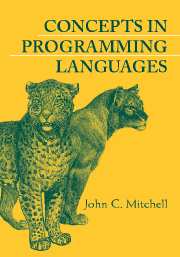Book contents
- Frontmatter
- Contents
- Preface
- Part 1 Functions and Foundations
- 1 Introduction
- 2 Computability
- 3 Lisp: Functions, Recursion, and Lists
- 4 Fundamentals
- Part 2 Procedures, Types, Memory Management, and Control
- Part 3 Modularity, Abstraction, and Object-Oriented Programming
- Part 4 Concurrency and Logic Programming
- Appendix A Additional Program Examples
- Glossary
- Index
1 - Introduction
from Part 1 - Functions and Foundations
Published online by Cambridge University Press: 05 June 2012
- Frontmatter
- Contents
- Preface
- Part 1 Functions and Foundations
- 1 Introduction
- 2 Computability
- 3 Lisp: Functions, Recursion, and Lists
- 4 Fundamentals
- Part 2 Procedures, Types, Memory Management, and Control
- Part 3 Modularity, Abstraction, and Object-Oriented Programming
- Part 4 Concurrency and Logic Programming
- Appendix A Additional Program Examples
- Glossary
- Index
Summary
“The Medium Is the Message”
Marshall McLuhanPROGRAMMING LANGUAGES
Programming languages are the medium of expression in the art of computer programming. An ideal programming language will make it easy for programmers to write programs succinctly and clearly. Because programs are meant to be understood, modified, and maintained over their lifetime, a good programming language will help others read programs and understand how they work. Software design and construction are complex tasks. Many software systems consist of interacting parts. These parts, or software components, may interact in complicated ways. To manage complexity, the interfaces and communication between components must be designed carefully. A good language for large-scale programming will help programmers manage the interaction among software components effectively. In evaluating programming languages, we must consider the tasks of designing, implementing, testing, and maintaining software, asking how well each language supports each part of the software life cycle.
There are many difficult trade-offs in programming language design. Some language features make it easy for us to write programs quickly, but may make it harder for us to design testing tools or methods. Some language constructs make it easier for a compiler to optimize programs, but may make programming cumbersome. Because different computing environments and applications require different program characteristics, different programming language designers have chosen different trade-offs. In fact, virtually all successful programming languages were originally designed for one specific use. This is not to say that each language is good for only one purpose.
Information
- Type
- Chapter
- Information
- Concepts in Programming Languages , pp. 3 - 9Publisher: Cambridge University PressPrint publication year: 2002
